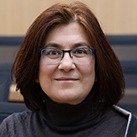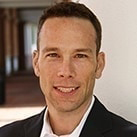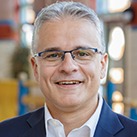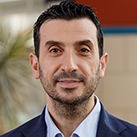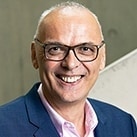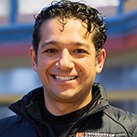Overview
The Operations and Technology Management (OTM) group has a leading reputation in 4 areas, in which we recruit, train and place our PhD students:
- innovation management and new product development
- healthcare operations
- sustainable operations
- managing risk, uncertainty and complexity
We cover a broad range of methodological expertise which we apply in our research and in which we train our PhD students, including mathematical modelling, data analytics and econometrics, and behavioural laboratory and field experiments.
Professor Stelios Kavadias talks about the Operations and Technology Management pathway
The pathway
To start on the Operations and Technology Management pathway you must take one of the following 9-month masters programmes:
MPhil in Strategy, Marketing, Operations and Organisational Behaviour
Essential reading
Download detailed information about the 9-month + 4-year programme structure and content.
Research areas
Study the fundamental principles that underlie the effective and efficient design and management of organisational processes, reliable partnerships and intra- and inter-organisational innovation capabilities.
Benefit from an approach that is inherently multi-disciplinary, drawing on economics, industrial engineering, psychology and human behaviour. You will also attain a solid understanding of other organisational functions, especially strategy, marketing and some aspects of finance.
Within the wider academic OTM community, Cambridge Judge Business School has a leading reputation in 4 key areas, in which we recruit, train and place our PhD students:
- innovation management and new product development
- healthcare operations
- sustainable operations
- managing risk, uncertainty and complexity
OTM faculty apply a broad range of methodological expertise in their research which you will be trained in, including mathematical modelling, data analytics and econometrics, and behavioural laboratory and field experiments.
You will benefit from a faculty that is committed to rigorous and impactful research, that leverages long-standing relationships with other research groups and academic partners around the world, as well as with organisations in the private and public sectors, especially healthcare, life sciences, insurance and financial services industries.
What we expect from you
You will need to have earned a first class bachelors degree or equivalent. In some cases you will need to have a masters degree from a highly regarded university and to have performed within the top 5% of your class. See the MPhil in Strategy, Marketing, Operations and Organisational Behaviour or Master of Research (MRes) academic requirements for more details.
You will demonstrate a high level of commitment to an academic career in a business school as well as a desire to engage with external organisations. While many of our students have first degrees in economics, mathematics, psychology, engineering or the sciences, students with a humanities degree will also be considered.
You can provide evidence of excellent writing skills, and strong evidence of your quantitative ability, either through results in statistics and calculus courses at university level or through GRE results. You may also have practical management experience although this is not a requirement.
For more details, please see the academic requirements for the:
MPhil in Strategy, Marketing, Operations and Organisational Behaviour
What you can expect from us
Prepare for an exciting and challenging academic research career in OTM with a multitude of benefits.
- Become part of our team from the outset, you will be treated as a junior colleague rather than a student. Experience an apprenticeship in the very best sense of that term.
- Your advisory team, a group of OTM faculty, will work with you and train you to become an independent researcher with an exciting research programme.
- Develop a portfolio of academic papers that will help you succeed in the job market and gain a junior faculty position in a leading business school after your PhD.
- Take a series of courses focused on research methodology and the foundations of the discipline as well as more advanced research seminars.
- Learn to critique recent publications and current working papers. This will enable you to shape and position your own work as a significant contribution to the academic literature.
- Receive practical research training, where you will develop and execute research projects jointly with faculty members.
- Explore rigorous methods and theoretical arguments with the practical goal of addressing highly relevant real-world problems and societal challenges.
- Engage with organisations directly, for example through summer internships, or by accompanying one of your advisors in their partner organisations.
- Opportunities to explore focused and in-depth academic research and potential to gain access to unique data.
- Build personal and academic relationships with faculty and fellow PhD students that will last a lifetime.
PhD supervisors
Your principal supervisor will be a senior academic, often a reader or professor, from within the Operations and Technology Management pathway. You will benefit from their guidance and counsel throughout the programme, and beyond: in helping you to succeed in the job market and in gaining a faculty position at a leading business school. Your principal supervisor will take an active role in your research programme and will assemble a group of faculty (your advisory committee) who will co-author papers with you.
Take a look at the faculty who may serve as your principal supervisor and view their research interests:
Feryal Erhun
Professor of Operations and Technology Management
Research interests
Feryal Erhun uses a synthesis of theory and practice-based research, her research focuses on (1) characterising, quantifying and eliminating system-wide inefficiencies in complex systems, such as supply networks and health care delivery, and (2) understanding the challenges of integration and strategic interactions between stakeholders in such complex systems. She holds honorary appointments with Cambridge University Hospitals and Papworth Hospital (the UK’s largest cardiothoracic hospital).
Jeremy Hutchison-Krupat
Associate Professor in Innovation and Operations Management
Research interests
Jeremy Hutchison-Krupat researches the decision processes through which firms can effectively implement their innovation strategy. In particular, the effect that i) resource allocation, ii) organisational structure, and iii) explicit and implicit incentive mechanisms have on a firm’s ability to generate ideas, select initiatives, and execute these initiatives.
Houyuan Jiang
Professor of Management Science
Research interests
Houyuan Jiang researches healthcare operations management, supply chain management and revenue management, for which he builds mathematical models, uncovers managerial insights, and develops computational methods. For healthcare operations management, at the strategic level, he is interested in designing appropriate contracts among healthcare payers and providers who interact, collaborate and compete vertically and horizontally. At the operational level, he is keen to design and analyse systems and processes that can efficiently utilise limited resources such as hospital beds and healthcare professionals.
Stylianos (Stelios) Kavadias
Margaret Thatcher Professor of Enterprise Studies in Innovation and Growth
Research interests
Stelios Kavadias researches the effectiveness of new product development (NPD) decisions with a particular focus on the decisions that concern: (i) the strategy implementation through the appropriate resource allocation rules and the definition of the “right” portfolio of new projects and products; (ii) the R&D ideation, search and experimentation process both at a firm level and the project team level; (iii) the effects of the organisational design and the associated incentive schemes on the product development outcome. At a broader level, seeking to understand the challenges that arise during the planning and execution phases of the innovation process, always with an operational/managerial perspective.
Nektarios (Aris) Oraiopoulos
Professor of Operations and Technology Management
Research interests
Aris Oraiopoulos researches our understanding of how firms can improve their new product development processes from the creation of new opportunities to the selection process and development. Technology and R&D management, particularly from the perspective of learning through collaborative agreements and joint development.
Daniel (Danny) Ralph
Professor of Operations Research
Research interests
Danny Ralph researches risk in business decision making; risk aversion in electricity markets; methods and models for optimisation problems and equilibrium systems.
Stefan Scholtes
Dennis Gillings Professor of Health Management
Not available to take incoming PhD students in October 2026
Research interests
Stefan Scholtes researches the challenges of organising high-quality and affordable healthcare services, with specific interests in (i) integration challenges in regional health economies, (ii) organisational design and management of hospitals and hospital systems, and (iii) predictive analytics for performance evaluation and comparison, based on routinely collected large datasets. His research is strongly practice-based and builds on long-term relationships with organisations in the local health economy, in particular with Cambridge University Hospitals and Papworth Hospital (the UK’s largest cardiothoracic hospital), where he holds honorary appointments.
Kishore Sengupta
Professor of Operations Management
Research interests
Kishore Sengupta researches project management; knowledge management; business value of technology.
Niyazi Taneri
Professor of Innovation and Operations Management
Research interests
Niyazi Taneri uses empirical and game-theoretic models to address two research streams: (i) product and business model innovation – where his research shows how firms should structure R&D, whether such theoretical predictions are followed in practice, and the consequences of deviating from theory; and, (ii) the impact of operations and technology on societal outcomes – where his research shows the critical role of operations on labour malpractice (e.g. child labour) and carbon emissions. Upcoming projects will also explore innovative contracts for R&D, the adoption of new business models, the value impacts of firms’ responses to cyber-attacks, and the effectiveness of police operations against drug trafficking.
Operations and Technology Management faculty
Learn more about the faculty that teach on this pathway.
Learn more about the Operations and Technology Management subject group


